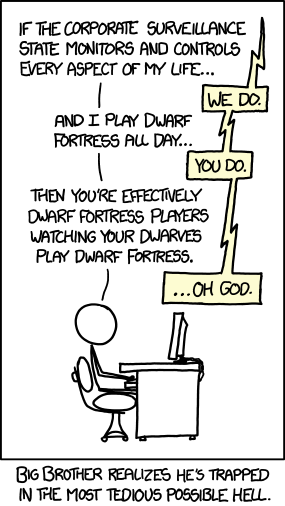 Responding to a popular
reaction to news of the National Security Agency’s massive data
collection program, blogger Daniel Sieradski started a Twitter
feed called “Nothing
to Hide.” He has retweeted hundreds of people who have declared
in one form or another that they are not concerned that the federal
government may spy on them. They say they have done nothing wrong,
so they have nothing to hide. If it helps the government fight
terrorists, go ahead, take their civil liberties away.
Responding to a popular
reaction to news of the National Security Agency’s massive data
collection program, blogger Daniel Sieradski started a Twitter
feed called “Nothing
to Hide.” He has retweeted hundreds of people who have declared
in one form or another that they are not concerned that the federal
government may spy on them. They say they have done nothing wrong,
so they have nothing to hide. If it helps the government fight
terrorists, go ahead, take their civil liberties away.
In his blog, a frustrated Sieradski listed many of the abuses of power our federal government is known for; he is not happy with the "nothing to hide" crowd.
There are many, many reasons to be concerned about the rise of the surveillance state, even if you have nothing to hide. Or rather, even if you think you have nothing to hide. For those confronted by such simplistic arguments, here are a three counterarguments that perhaps might get these people thinking about what they’re actually giving up.
1. Every American Is Probably a Criminal, Really
That Americans think they have nothing to hide in the first place is a sign of how little attention they're paying to the behavior of our Department of Justice. Many Americans have run afoul of federal laws without even knowing it. Tim Carney noted at the Washington Examiner:
Copy a song to your laptop from a friend's Beyonce CD? You just violated the Digital Millennium Copyright Act. Did you buy some clothes in Delaware because they were tax free? You're probably evading taxes. Did you give your 20-year-old nephew a glass of wine at dinner? Illegal in many states.
Citizens that the federal government wants to indict, the federal government can indict if it monitors them closely enough. That's why it's so disturbing to learn that the federal government doesn't need to obtain a warrant on us in order to get our emails and phone records.
 Attorney Harvey Silverglate
even
wrote a book about it,
Three Felonies a Day: How the Feds Target the
Innocent. The Department of Justice has been notably and
egregiously using federal laws to destroy lives. Former Tribune
employee
Matthew Keys is facing federal charges and possibly prison time
because he gave his old password to a member of Anonymous, who
changed a headline at the website for the Los Angeles
Times. The vagueness of the Computer Fraud and Abuse Act makes
violating a website’s terms of
service a possible felony. We’re not just referring to
government websites. All websites. Given the digital focus of the
PRISM program, everybody should be concerned about what could
potentially happen should that data end up in the hands of federal
prosecutors.
Attorney Harvey Silverglate
even
wrote a book about it,
Three Felonies a Day: How the Feds Target the
Innocent. The Department of Justice has been notably and
egregiously using federal laws to destroy lives. Former Tribune
employee
Matthew Keys is facing federal charges and possibly prison time
because he gave his old password to a member of Anonymous, who
changed a headline at the website for the Los Angeles
Times. The vagueness of the Computer Fraud and Abuse Act makes
violating a website’s terms of
service a possible felony. We’re not just referring to
government websites. All websites. Given the digital focus of the
PRISM program, everybody should be concerned about what could
potentially happen should that data end up in the hands of federal
prosecutors.
The “nothing to hide” crowd's involvement in political activism is likely limited. That’s perfectly fine. Nobody should feel obligated to join the Occupy movement or a Tea Party organization or be the kind of person who might end up on a politician’s enemies list. But to say “I have nothing to hide” is a fundamentally selfish declaration. What about parents, sisters, brothers, partners, and other loved ones? Can we say the same for them? You don’t have to have an illness whose suffering can be eased with the use of medical marijuana to be concerned about the way the federal government treats this industry. Would you say, “I don’t need medical marijuana so I don’t care if they imprison those who do”? Sadly, some people do. Fundamentally, saying “I have nothing to hide,” is similar to saying “I don’t care about those who do.”
Next: The problem with trusting the government.
2. The Federal Government Has Abused its Surveillance Powers Before
 While most Gen Xers were still very young
and before any Millennials were born America went through
similar controversies in the wake of the Vietnam War and the
Watergate Scandal. In 1975, Senator Frank Church (D-Idaho) put
together a committee (which would eventually be known as the
Church
Committee) to investigate abuses of the law by intelligence
agencies. Abuses included spying on leftist activists, opening and
reading private mail, and using the IRS as a weapon. Sound
familiar? There’s a reason why Baby Boomers have started comparing
Barack Obama to Richard Nixon. The value of doing so has been lost
to the ages; everything politically awful that happens in America
is compared to Tricky Dick.
While most Gen Xers were still very young
and before any Millennials were born America went through
similar controversies in the wake of the Vietnam War and the
Watergate Scandal. In 1975, Senator Frank Church (D-Idaho) put
together a committee (which would eventually be known as the
Church
Committee) to investigate abuses of the law by intelligence
agencies. Abuses included spying on leftist activists, opening and
reading private mail, and using the IRS as a weapon. Sound
familiar? There’s a reason why Baby Boomers have started comparing
Barack Obama to Richard Nixon. The value of doing so has been lost
to the ages; everything politically awful that happens in America
is compared to Tricky Dick.
The defense that the current secret NSA/PRISM data collection plan can only target foreigners in foreign territory shouldn’t settle anything, even if it’s actually true, because that’s just a description of how the plan is currently being used, not how it might be used tomorrow or under the next presidential administration. And we have absolutely no way of knowing that the description of how the program operates is true anyway, because the oversight has been hidden from public view. We do know that a court ruling in 2011 determined that the U.S. government had engaged in unconstitutional behavior in its surveillance program, but the Department of Justice is trying to block Americans from seeing this court ruling and understanding what happened. We’re supposed to trust this oversight. We know they’ve broken the law once, but we don’t know what they did, what's stopping it from happening again, what harm was caused, and whether there was any sort of punishment or discipline.
Next: Not even the government can really control where data ends up.
3. Government Is Made of People, and Some People Are Creepy, Petty, Incompetent, or Dangerous
Gilberto Valle had an unusual sexual fetish. He fantasized about kidnapping, killing, and eating young women.
 Valle was also a member of the
New York Police Department, and
was convicted in March of plotting to make his fantasies a
reality. Whether he really meant to do so is up in the air (his
defense was that this was all sexual roleplay), but he was also
convicted of looking up his potential targets in a national crime
database, accessible due to his position of authority.
Valle was also a member of the
New York Police Department, and
was convicted in March of plotting to make his fantasies a
reality. Whether he really meant to do so is up in the air (his
defense was that this was all sexual roleplay), but he was also
convicted of looking up his potential targets in a national crime
database, accessible due to his position of authority.
While the federal government is arguing that all this massive metadata being collected by the National Security Agency is subject to significant oversight and not subject to abuse, it is at the same time trying to blame the IRS targeting political and conservative nonprofits for special questioning as the actions of rogue employees and poor management.
You don’t have to be a privacy purist to be concerned about bad or dangerous people getting information about you. Some of them work for the government, and they may be interested in you for reasons that have nothing to do with politics. Even if you have nothing to hide.

 I was reading up on the
National Security Agency's data-mining program when I came across
this tweet by Matt Apuzzo of the Associated Press:
I was reading up on the
National Security Agency's data-mining program when I came across
this tweet by Matt Apuzzo of the Associated Press:








